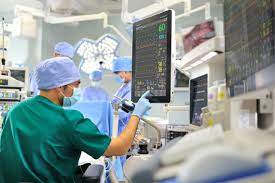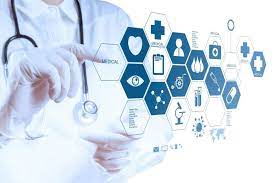Hello!
 Technology is the defining feature of our age. There are technology-related jobs in every industry. Healthcare-related tech jobs are among the most high-paid jobs in the world. Healthcare is an important and reliable industry. For good health, people will need to have access to nurses and doctors.
Technology is the defining feature of our age. There are technology-related jobs in every industry. Healthcare-related tech jobs are among the most high-paid jobs in the world. Healthcare is an important and reliable industry. For good health, people will need to have access to nurses and doctors.
Healthcare Technology Jobs
Computer systems and electronic equipment are the core of health information technology. This digital system allows healthcare facilities to maintain a safe, orderly, and organized database of patient records. IT-related backgrounds may make a career in healthcare information technology attractive. You can work in the IT sector if you are interested.
A career in health information technology involves assessing the use of information technology by a medical facility to prepare necessary documents. These documents include personal health records (PHRs), digital prescribing (EPRs), and privacy.
 To ensure people’s health, it is important to understand the healthcare industry. People need to work in order to make a living. It is important to look for lucrative jobs that will provide a steady income for their family and themselves. This informative article will give you a glimpse into the life and duties of healthcare technology workers.
To ensure people’s health, it is important to understand the healthcare industry. People need to work in order to make a living. It is important to look for lucrative jobs that will provide a steady income for their family and themselves. This informative article will give you a glimpse into the life and duties of healthcare technology workers.
A Brief Look into different Healthcare Technology Jobs
Health Information Technician
This role has the following basic duties: A health information technologist is an information technology specialist who assists in management. This person is responsible for managing the vital data of a healthcare facility’s employees, patients, and medical records. They are also responsible for ensuring that data is kept safe and secure so no important information is lost. They are responsible for the organization of patient records to make them easily accessible to doctors and other medical professionals.
 The person must also regularly update databases, registries, as well as insurance records, for the medical facility. Technicians can evaluate the effectiveness of operations and diagnostic tests by keeping track of patient’s medical records.
The person must also regularly update databases, registries, as well as insurance records, for the medical facility. Technicians can evaluate the effectiveness of operations and diagnostic tests by keeping track of patient’s medical records.
Medical coder
This role has one primary responsibility: A medical coder, a medical coding professional who assists in filing health insurance claims. Medical coders are responsible for assigning unique identification numbers to each procedure and medical condition. Each document, such as the electronic health record (EHR), is assigned a number by the technician.
This person is responsible for verifying the accuracy of insurance claims and coordinates with the insurance companies to resolve any problems. The person also determines the appropriate coverage levels for their patients. Medical coders work closely with billing departments to ensure patients pay their bills in full and on time.
Health Services Administrator
 The day-to-day operations of a healthcare organization are managed by a health services administrator. Administrators working in the medical field use computers and the internet to track patients’ appointments as well as customers’ insurance information. Administrators of health services are responsible for making suggestions to improve the quality of the care they provide.
The day-to-day operations of a healthcare organization are managed by a health services administrator. Administrators working in the medical field use computers and the internet to track patients’ appointments as well as customers’ insurance information. Administrators of health services are responsible for making suggestions to improve the quality of the care they provide.
Clinical Informaticist
Clinical informaticists are people who study and analyze the use of technology and data by medical facilities. Clinical informaticists assist in the organization and collection of clinical data such as patient information and health records. They offer advice on improving the data management of healthcare facilities.
They also work to create a plan for the use of health information systems. Many clinical informaticists gained experience in clinical settings at an early stage in their careers. This is to ensure that they can provide relevant and accurate advice. Their work is based on a thorough understanding of healthcare and industry standards.
IT Analyst
 IT analysts are responsible for assessing the client’s IT infrastructure, and making strategic recommendations to improve it. IT analysts are able to monitor how companies use IT and help with the rollout of new gear. They can also lead data recovery and disaster recovery efforts.
IT analysts are responsible for assessing the client’s IT infrastructure, and making strategic recommendations to improve it. IT analysts are able to monitor how companies use IT and help with the rollout of new gear. They can also lead data recovery and disaster recovery efforts.
In the healthcare industry, IT analysts may be responsible for creating systems to archive patient information and coordinate appointment scheduling. The system is developed based on the use of information technology in clinical settings.
Chief Information Officer
The chief information officer (CIO), is a top executive responsible for managing an organization’s IT operations. Chief information officers (CIOs), can monitor how their companies use IT in order to identify areas where cyber security could be improved.
They also analyze the areas where IT processes could be improved and establish IT standards across the company. The job of a healthcare CIO may include the creation of new IT applications to support patients and doctors.
Chief Technology Officer
 The chief technology officer (CTO), a top-ranking executive, is responsible for overseeing the use of technology within an organization. The company’s chief technology officer (CTO) can oversee its hardware and software to ensure it is useful.
The chief technology officer (CTO), a top-ranking executive, is responsible for overseeing the use of technology within an organization. The company’s chief technology officer (CTO) can oversee its hardware and software to ensure it is useful.
They also decide on the introduction of new technologies and the purchase of them. The CTO sets guidelines to ensure that the resources are used appropriately. They can also be responsible for leading an IT department, which means they must recruit and train new employees.
Also read:
- Swing Trading Strategies and Tips for Beginners
- What is Crawl Budget?
- How to MLOps Platforms Can Benefit Your Business
Final Thoughts
These are all lucrative jobs that offer many benefits. Due to its high demand, many people choose jobs within the healthcare sector, particularly in technology-related positions. You can be confident that you will stick with this sector if you have the skills and are willing to learn. You need a steady job to ensure your livelihood. Healthcare technology jobs can be lucrative and comfortable. They also have a significant impact on the lives of patients.
Thank you!
Join us on social media!
See you!






